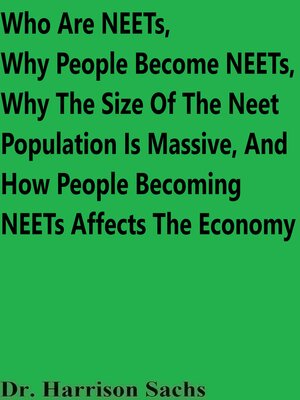Who Are NEETs, Why Certain People Become NEETs, Why the Size of the NEET Population Is Massive, and How the Economy Is Affected by Certain People Being NEETs
audiobook (Unabridged)
By Dr. Harrison Sachs

Sign up to save your library
With an OverDrive account, you can save your favorite libraries for at-a-glance information about availability. Find out more about OverDrive accounts.
Find this title in Libby, the library reading app by OverDrive.



Search for a digital library with this title
Title found at these libraries:
| Library Name | Distance |
|---|---|
| Loading... |
This audiobook is narrated by a digital voice.
This essay sheds light on who are NEETs, explicates why certain people become NEETs, elucidates why the size of the NEET population is massive, and expounds upon the economy is affected by certain people being NEETs. NEETs are deemed to be people who are "not in education, employment, or training". NEETs are not only people who are not part of the real private sector workforce, but are also people who are "not receiving an education" and who are not receiving vocational training. The acronym NEETs does not refer to people who are in their senior years, but rather refers to young people who are not part of the real private sector workforce, who are "not receiving an education", and who are not receiving vocational training. As of December of 2024, the age range of NEETs is about 15 years old to 34 years old. Even though not everyone in this aforementioned age range is deemed to be a NEET, most people who are in this aforementioned age range are NEETs as of December of 2024. There are a myriad of disparate reasons as to why certain people become NEETs. Even though a copious amount of people become NEETs, not every person resorts to becoming a NEET. One of the primary reason as to why certain people become NEETs is attributed them being eminently deterred to work real private sector employee jobs based on voluntary demand. Lamentably, most real private sector employee jobs based on voluntary demand are often deemed to be dead-end, highly time-depleting, debilitating, minimum wage, dispiriting, unfulfilling, undesirable, harrowing, distressful, brutally wretched, ineffably agonizing jobs that not only drain almost all of the employee's sacrosanct time, but also do not pay anything close to 1/4 of a subsistence wage for affording housing. Most real private sector employers are keen on not offering any benefits nor pension to their employees in spite of how much hard work, time, effort, and mental bandwidth that they expended fulfilling their job responsibilities.







